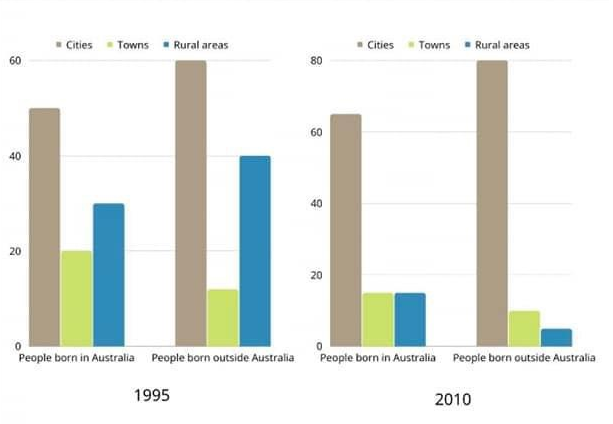[Sarah R] Writing Practice Test 1413243
Task 1
You should spend about 20 minutes on this task.
The bar chart below describes some changes about the percentage of people were born in Australia and who were born outside Australia living in urban, rural and town between 1995 and 2010.
Summarise the information by selecting and reporting the main features and make comparisons where relevant.
You should write at least 150 words.

The bar chart illustrates the proportion of populate were delivered in and outside Australia who was living in cities, rural, and town area from 1995 to 2010
Overall, citizens who were born in cities both inside and outside the country by far had the highest level of the birth over the whole period, while towns in year 1995 and rural areas in year 2010 had the lowest percentages in each period.
People who were born in Australia at the first year was around 50% in cities, 20% in town, and 30% in rural areas. over 15-year period, it experienced an increase in cities approximately well over 60%, while towns and rural areas birthrate have dropped to the similar numbers below 20%.
On the other hand, citizens who were born outside the Australia mostly born in the cities with 60% in the first year and increasing roughly in 15 years to 80%. In 1995, town become the lowest birthrate outside the country below the rural areas with 40% birthrate. But, over the next 15 years, the gap between town and rural areas decreased, largely because the birthrate in rural areas experienced a sharp decline while the percentages of birth in town has remained the same
Task 2
You should spend about 40 minutes on this task.
Rich countries often give money to poorer countries, but it does not solve poverty. Therefore, developed countries should give other types of help to the poor countries rather than financial aid. To what extent do you agree or disagree?
You should write at least 250 words.
Some wealthy countries frequently provide help in the form of money yet it doesn't solve penury. So, they should afford other types of assistance instead of financial aid. I personally agree with this statement owing to giving the poorer better education and build the infrastructure in their place.
Education is the most fundamental basis in our life nowadays, it can lead us to a better future with knowledges and experienced got from the studies. Many people from a poor who get a chance to pursue a higher education whether in the city or overseas then become a successful person, not only in their income but also in their way of thinking, they bring out their families into the convenient life. Therefore, education is the essential one to applied in targeted countries, since financial aid is a help that only benefits for a short time.
Another point to consider is infrastructure establishment, poorer countries usually have a bad infrastructure, which results in difficulty in several sectors. For instance, some rural areas in Indonesia have a limited access due to terrible roads caused by none of the infrastructure has established, such as; trading, transportation, trading and the ease of access, in contrast with big cities that have many accessible facilities which obtained the economic growth. Therefore, these need to be considered as a donation to help the countries with poverty.
In conclusion, I strongly agree about education and infrastructure development conducted in the countries who needs help instead of giving them cash since it is only surviving in the short-time period whilst these arguments consist a long-time effect to their economic growth
Community’s feedback
Sorry! We couldn't find any contents.
Score Given by Community
Give a bandscoreLeaderboard:
| # | User | Score | Time | |
|---|---|---|---|---|
| Kento Nanami |  | 8.5 | 52:31 | |
| Nayef Alhajraf |  | 8.5 | 60:00 | |
| Ella Ruppo |  | 7.5 | 59:39 | |
| 4 | chengxi yu |  | 7.0 | 00:00 |
| 5 | avin chui |  | 7.0 | 59:11 |
| 6 | 癫 火 |  | 7.0 | 59:51 |
| 7 | Li Xuefeng |  | 6.5 | 03:46 |
| 8 | Chanisara Wongkongsang |  | 6.5 | 56:37 |
| 9 | Dan H |  | 6.0 | 50:41 |
| 10 | Carlo Di Giacomo |  | 6.0 | 60:00 |



